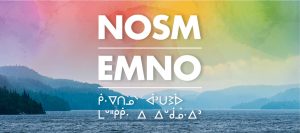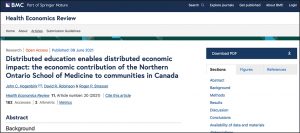This has been a sad month with the discovery of remains of 215 Indigenous children on the Tk’emlúps te Secwépemc First Nation site of the former Kamloops Indian Residential School in British Columbia and the senseless tragedy that took place in London, Ontario with the deaths of four members of a Muslim family and one nine-year-old badly injured and orphaned. These events occurring at the same time as pandemic-related conflicts, including anti-Asian racism, the conflict in Gaza, Black Lives Matter, mental health surges, and long-term care challenges have exposed the tragic impacts on both our young, aged and vulnerable populations. It is also a challenging Pride month as homophobia, transphobia, biphobia and many other gender identity phobias continue to persist in our society.
How do we all cope? As health-care learners and providers, how do we sustain our hope?
Although these political divides, differences in beliefs, socio-economic disparities, and unrelenting media stories of grief and strife may leave us feeling defeated, angry and helpless, the truth is that we are empowered and in positions to make an impact and influence change. By standing strong together, we can make a difference in this world. I am actually feeling pretty inspired right now, so I encourage you to have heart. Let’s look toward to a brighter future.
We’ve just made history here! NOSM has begun a fantastic, unprecedented journey to become Canada’s first free-standing medical university. NOSM University will continue to focus on equity, increasing diversity, and strengthening the culture of inclusion. We will lead in this space.
We are committed and will come together to stop racism in its tracks. We endeavour to look beyond the geographic, linguistic, economic and social conditions and seek to further understand the root causes. NOSM University commits to taking responsibility and looking for actionable ways to make a difference.
A few of you (individually and privately) have reached out to me, especially after I spoke about optimism in my interview with Matt Galloway on CBC’s The Current. You have asked me: ‘How do you keep your chin up?’ Truthfully, it’s been a challenge, however I have a renewed sense of purpose in justice, in standing for what is inherently right, and in support for the truth. What motivates me is doing what is right. This is the value of advocacy and activism that underpins NOSM University’s work. These are the transformative times we will tell our children and grandchildren about. We will collectively be able to say: “I was part of the historic change.”
June is National Indigenous History Month and Pride Month, a time to celebrate the diverse Indigenous histories, heritages, and the cultures of the many LGBTQ2SI+ communities. It is an ideal time to reflect on the richness that NOSM University learners, staff, faculty, communities and partners bring to all our lives. I see and hear social accountability in action everywhere in our distributed campus.
A key measure of NOSM’s leadership in Northern Ontario is the economic impact on participating communities. NOSM’s economic impact is estimated to be at least 60 per cent greater than the original government investment in our School. This increase provided an economic stimulus and, along with NOSM graduates who set up practice in the region, has indubitably improved the health and wealth of communities. With this in mind, NOSM University will continue to grow and expand on its socio-economic and political impact (please refer to the recent study below). Our social justice impact will be measured by the work we do in speaking up, advocating for real change, and standing together against all challenges.
This summer, as we embrace the transformative change of NOSM to NOSM University, I encourage you to reflect on the ways in which you are empowered to influence positive changes in society. With each interaction, ask yourself if you are courageous enough, compassionate enough and kind enough to make a difference.
My key message is this: “Be a citizen of the world, be courageous in the world, be a leader in the world. Let change, courage and citizenship be the three Cs that will guide you through the rest of your life.”
Miigwetch, thank you, marsi, merci,
Dr. Sarita Verma
Dean, President and CEO
Northern Ontario School of Medicine
If you have any feedback or comments, please reach out at dean@nosm.ca and follow me on twitter @ddsv3.

Celebrate National Indigenous History Month
There are many ways you can honour and celebrate National Indigenous History Month. Please help share in the celebration by engaging in learning and sharing your favourite resources. For a full list of suggested resources, please visit the Office of Indigenous Affairs and refer to the links below. Mark your calendar for National Indigenous People Day on June 21 and participate in a local event.

Have Pride at NOSM University
Participate, take action or be an active ally by contacting your local pride organisation to find out what your community has planned to celebrate Pride Month. Also, visit the Northern Ontario Pride Network to learn about how communities across Northern Ontario are connecting and advocating against homophobia, biphobia, transphobia and all gender identity phobias. Membership is free and open to all individuals and organizations. Like, share and follow the Network on Facebook to access the latest events, ideas, resources and promotional activities, and to support diverse sexualities, gender identities, and expression. Let’s embrace our differences at NOSM, learn more at Respect The Difference.

NOSM University Consultations
Throughout the summer we will be consulting broadly with all of our stakeholders as we move forward to shape the vision of the new NOSM University. Your voice is important and highly valued. We want to know what NOSM University means to you and how it should meet your needs. Please email your questions and ideas to nosmu@nosm.ca.

Study of NOSM’s Economic Impact
Did you know that “NOSM-trained physicians practising in the region added an economic impact of $88 M.” to the economy of Northern Ontario? In 2019, NOSM’s total economic impact is estimated to be $107 million and since that time it continues to increase. NOSM University is proud of this positive contribution and continued plans to stimulate the economy of Northern Ontario. Read the full study on the BMC website.

The Timmins tag team
“Louisa Marion-Bellemare and Julie Samson were seeing more and more young, healthy people in the ER with drug overdoses, but they didn’t see the city or local agencies doing enough to stop it. So they took matters into their own hands – and the community followed their lead.” Learn more about this inspiring work by NOSM faculty in this article from The Globe and Mail.







